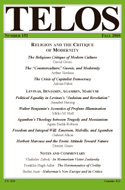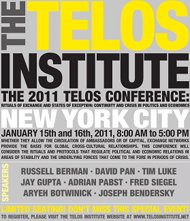By Telos Press · Friday, October 22, 2010 From Telos 152 (Fall 2010), Arthur Versluis’s “The ‘Counterculture,’ Gnosis, and Modernity.” Read the full version at TELOS Online website.
Abstract
 Interpretations of the 1960s counterculture vary widely but often do not include discussion of its religious origins and significances. The counterculture represented the emergence into broader society of an essentially gnostic perspective, that is, a perspective that emphasizes above all not faith in a historical narrative promising a religious or secular millennium somewhere ahead, but direct individual spiritual insight here and now, as Theodore Roszak pointed out in his seminal The Making of the Counterculture. Interpretations of the 1960s counterculture vary widely but often do not include discussion of its religious origins and significances. The counterculture represented the emergence into broader society of an essentially gnostic perspective, that is, a perspective that emphasizes above all not faith in a historical narrative promising a religious or secular millennium somewhere ahead, but direct individual spiritual insight here and now, as Theodore Roszak pointed out in his seminal The Making of the Counterculture.
Continue reading →
By Telos Press · Thursday, October 14, 2010 From Telos 152 (Fall 2010), David Gross’s “A New Direction: The Religious Critique of Modern Culture.” Read the full version at TELOS Online website.
Abstract
 In their analyses of modern life, cultural critics in the twentieth and twenty-first centuries have drawn on many strains of thought but have generally overlooked religion as a source of Kritik. This article investigates the observations and insights that can be found in certain Western religious (and, more particularly, Catholic) traditions, and then assesses their overall value or usefulness for contemporary cultural criticism. In their analyses of modern life, cultural critics in the twentieth and twenty-first centuries have drawn on many strains of thought but have generally overlooked religion as a source of Kritik. This article investigates the observations and insights that can be found in certain Western religious (and, more particularly, Catholic) traditions, and then assesses their overall value or usefulness for contemporary cultural criticism.
Continue reading →
By Telos Press · Monday, September 20, 2010 Please note: the deadline for proposals has been extended to October 1, 2010.
Rituals of Exchange and States of Exception:
Continuity and Crisis in Politics and Economics
January 15-16, 2011
New York City
 Whether they allow the circulation of ambassadors or of capital, exchange networks provide the basis for global cross-cultural relationships. Though liberal democratic governments pride themselves on the rationality of their procedures, diplomatic protocols and the give-and-take of parliamentary politics attest to complex customs that lie at the heart of such practices. Similarly, recent crises have demonstrated that international financial markets cannot be reduced to a numbers game, however complex, but function on the foundation of a network of promises whose dependability is a matter of habits. Focusing on the contemporary world, this conference will investigate the rituals and protocols that regulate political and economic relations in areas of stability and the underlying forces that come to the fore in periods of crisis. We encourage submissions of paper proposals from scholars in a variety of disciplines including critical theory, philosophy, literature, politics, theology, anthropology, political economy, and cultural studies. Whether they allow the circulation of ambassadors or of capital, exchange networks provide the basis for global cross-cultural relationships. Though liberal democratic governments pride themselves on the rationality of their procedures, diplomatic protocols and the give-and-take of parliamentary politics attest to complex customs that lie at the heart of such practices. Similarly, recent crises have demonstrated that international financial markets cannot be reduced to a numbers game, however complex, but function on the foundation of a network of promises whose dependability is a matter of habits. Focusing on the contemporary world, this conference will investigate the rituals and protocols that regulate political and economic relations in areas of stability and the underlying forces that come to the fore in periods of crisis. We encourage submissions of paper proposals from scholars in a variety of disciplines including critical theory, philosophy, literature, politics, theology, anthropology, political economy, and cultural studies.
Continue reading →
By Telos Press · Wednesday, April 21, 2010 In partnership with the Telos Institute, Telos is launching a new annual essay prize competition, inviting graduate students and post-graduate researchers in the humanities to tell the world about their work.
The competition offers young scholars the opportunity to be published in one of the leading international interdisciplinary journals. The panel of judges, which includes the editorial board of Telos as well as outside judges, is looking for creative, fresh, and original contributions in the area of politics, philosophy, critical theory, theology, culture, and the arts. There is no specific question or theme.
The winning essay will be published in a regular issue of Telos in the course of 2011. The winner will be given a free annual subscription to the journal as well as a free copy of a book published by Telos Press of his or her choice.
Continue reading →
By Telos Press · Monday, June 8, 2009 The Third Annual Telos Conference is scheduled for Saturday, January 16, 2010, in New York City. The topic will be “From Lifeworld to Biopolitics: Empire in the Age of Obama.”
In the context of a dramatic reorganization of the relationships among state, market, and society, the 2010 Telos conference will turn its attention to competing accounts, both theoretical and empirical, of the new modalities of administration, domination, and power. Facing the authoritarian state and a politicized market, how does one “defend society”?
Continue reading →
By Telos Press · Wednesday, March 5, 2008 Hear Matthias Küntzel, author of the controversial Jihad and Jew-Hatred: Islamism, Nazism and the Roots of 9/11, speak at Cooper Union in New York City:
Saturday, March 22
6:30 pm
The Cooper Union’s Wollman Auditorium (Engineering Building)
located at 7 East 7th Street at Third Avenue
Directions (by subway): Astor Place stop on the #6 line, or 8th St. stop on the R train, or a short walk from the Union Square subway station.
Admission is free!
www.cooper.edu
Continue reading →
|
|
 Interpretations of the 1960s counterculture vary widely but often do not include discussion of its religious origins and significances. The counterculture represented the emergence into broader society of an essentially gnostic perspective, that is, a perspective that emphasizes above all not faith in a historical narrative promising a religious or secular millennium somewhere ahead, but direct individual spiritual insight here and now, as Theodore Roszak pointed out in his seminal The Making of the Counterculture.
Interpretations of the 1960s counterculture vary widely but often do not include discussion of its religious origins and significances. The counterculture represented the emergence into broader society of an essentially gnostic perspective, that is, a perspective that emphasizes above all not faith in a historical narrative promising a religious or secular millennium somewhere ahead, but direct individual spiritual insight here and now, as Theodore Roszak pointed out in his seminal The Making of the Counterculture.  Whether they allow the circulation of ambassadors or of capital, exchange networks provide the basis for global cross-cultural relationships. Though liberal democratic governments pride themselves on the rationality of their procedures, diplomatic protocols and the give-and-take of parliamentary politics attest to complex customs that lie at the heart of such practices. Similarly, recent crises have demonstrated that international financial markets cannot be reduced to a numbers game, however complex, but function on the foundation of a network of promises whose dependability is a matter of habits. Focusing on the contemporary world, this conference will investigate the rituals and protocols that regulate political and economic relations in areas of stability and the underlying forces that come to the fore in periods of crisis. We encourage submissions of paper proposals from scholars in a variety of disciplines including critical theory, philosophy, literature, politics, theology, anthropology, political economy, and cultural studies.
Whether they allow the circulation of ambassadors or of capital, exchange networks provide the basis for global cross-cultural relationships. Though liberal democratic governments pride themselves on the rationality of their procedures, diplomatic protocols and the give-and-take of parliamentary politics attest to complex customs that lie at the heart of such practices. Similarly, recent crises have demonstrated that international financial markets cannot be reduced to a numbers game, however complex, but function on the foundation of a network of promises whose dependability is a matter of habits. Focusing on the contemporary world, this conference will investigate the rituals and protocols that regulate political and economic relations in areas of stability and the underlying forces that come to the fore in periods of crisis. We encourage submissions of paper proposals from scholars in a variety of disciplines including critical theory, philosophy, literature, politics, theology, anthropology, political economy, and cultural studies. 

